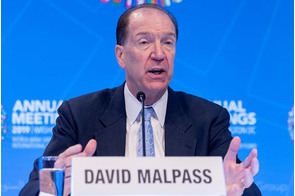Latest News
IMF warns of global public debt approaching 100 percent of GDP

News Highlight
Country-specific responses will be critical in maintaining stability and avoiding further deterioration in public finances, said IMF Director of Fiscal Affairs Department, Vitor Gaspar.
Global public debt is rising to historic levels and fiscal pressures are intensifying, Director of Fiscal Affairs Department at the International Monetary Fund (IMF), Vítor Gaspar, warned Tuesday (April 22) at the launch of the IMF’s Spring Fiscal Monitor in Washington, D.C.
“The Spring Fiscal Monitor documents that global public debt is high and rising, approaching 100% of GDP by the end of the decade and surging above the pandemic peak,” Gaspar said. “High debt, low growth, rising interest costs, spending pressures, and elevated policy uncertainty contribute to narrower fiscal space, making policy trade-offs starker and policy choices more painful.”
He emphasised that country-specific responses will be critical in maintaining stability and avoiding further deterioration in public finances.
“The fiscal monitor shows that public finance positions and prospects are very different across countries. Countries will need to first and foremost keep their own house in order. This involves three key priorities. First, fiscal policy should be part of overall stability-oriented macroeconomic policies. Second, fiscal policy should, in most countries, aim at reducing public debt and building buffers to create space to respond to spending pressures and economic shocks. Lastly, fiscal policies should, together with other structural policies, aim at improving potential growth, thereby easing policy tradeoffs.”
Gaspar noted the importance of fiscal response during times of economic and financial distress, pointing to recent crises as key examples.
He said in a statement by IMF on the latest fiscal monitor report that if a crisis occurs, fiscal policy has an important role to play. He enumerated the role to include support for the central bank in its efforts to preserve financial stability and orderly market conditions. According to him, such complementarity was crucial in recent episodes, as in the Global Financial Crisis and the pandemic.
The IMF chief also said fiscal policy should be counter cyclical. According to him, it is crucial that the public sector leans against the wind of private sector deleveraging. Otherwise, the crisis will be deeper and longer. But this requires fiscal space.
He added that in extreme cases, public finance may be at the centre of the crisis and timely and orderly debt restructuring may be required.
Despite the risks, Gaspar struck a hopeful tone, calling for long-term thinking and collaborative action.
“In these times of high uncertainty, fiscal policy must be an anchor for confidence and stability that helps delivering growth and prosperity for all. A crisis is by no means a foregone conclusion. There is still a time to build a more balance, resilient, global economy. Ministers of Finance must build trust, tax fairly, spend wisely and take the long view,” Gaspar said.
Related News
Latest Blogs
- How Tinubu is ensuring equitable access to public services
- Nigeria’s economic reform faces new threats
- What Ould Tah’s tenure at BADEA reveals about his AfDB candidacy
- Implementation strategy crucial for the success of 12-4 education policy
- A senator’s suspension threatens the right of representation
Most Popular News
- Artificial intelligence can help to reduce youth unemployment in Africa – ...
- Nigeria records $6.83 billion balance of payments surplus in 2024
- Tinubu appoints new Board Chair, Group CEO for NNPC Limited
- Tariffs stir inflation fears in US but offer targeted industry gains ...
- CBN net reserve hits $23.1 billion, the highest in three years
- Soaring civil unrest worries companies and insurers, says Allianz









